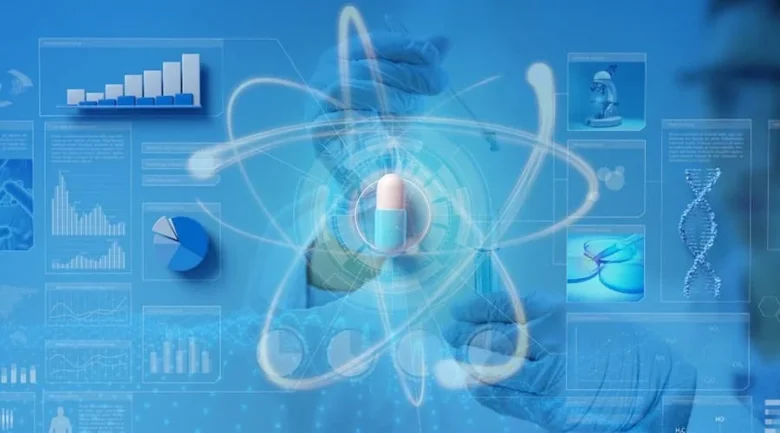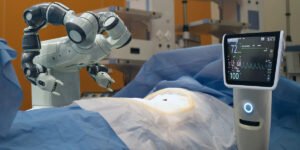The search for new drugs has long been characterized by slow work, high prices, and high failure rates. But artificial intelligence (AI) is dramatically changing the way medical research is conducted. Artificial intelligence is a powerful tool that is accelerating drug development and changing the way scientists search for potential drug candidates, make formulations work better, and guess what will happen next. This article describes how artificial intelligence is changing the process of finding new medicines. It looks at how new ideas can usher in a new era of efficiency, accuracy, and ultimately life-saving medicine.
Looking for New Medicines
- A process that takes a lot of time: The old ways of finding new drugs are difficult and time-consuming. From target discovery to preclinical testing, the path from laboratory to pharmacy is fraught with hurdles that can take years to overcome.
- Many resources and high costs: It costs a lot of money to create a new drug. Research, clinical trials, and regulatory approval can cost billions of dollars, meaning many people who want to make a drug can’t do so because they can’t afford it.
- Many people fail: Many people are leaving the field of pharmaceutical research. Many potential drug candidates fail to progress through several development steps because they don’t work, have unexpected side effects, or pose other safety risks.
The Dawn of Artificial Intelligence in Drug Discovery
- Data-driven insights: Artificial intelligence loves data, and the vast amounts of biological data now available make finding new drugs very easy. Machine learning algorithms can look at complex data sets to discover trends, correlations, and potential drug targets.
- Predictive models: Artificial intelligence makes predictive modeling easier, allowing researchers to guess how possible drug options might work. This ability to predict the future makes it easier to find the molecules most likely to work, saving time that would otherwise be spent on less promising pathways.
- Medicine at the individual level: Personalized treatment is possible thanks to artificial intelligence, which looks at patient data to find specific genetic markers or characteristics. This approach tailors the medication to each patient, making the treatment more effective and reducing side effects.
How Artificial Intelligence can Help find New Medicines?
- Search and verify the target: Artificial intelligence speeds up the process of finding and identifying potential drug targets. Artificial intelligence programs look at biological data such as genomics and proteomics to find molecules or proteins linked to diseases. This provides a starting point for drug developers.
- Screening and optimization of compounds: Virtual screening using artificial intelligence speeds up the process of finding potential drug options. Algorithms can look at large numbers of chemicals and guess at the effectiveness and safety of combinations. This makes the process of selecting lead molecules faster and easier.
- Find biomarkers: Biomarkers are important in the development of new drugs because they help group patients and monitor their treatment. Artificial intelligence looks at many different data sets to find biomarkers that can help develop targeted treatments and improve the success of clinical trials.
Real World Success Stories
- Medical care in the cloud: Insilico Medicine, a leader in AI-driven drug discovery, uses deep learning to guess molecular structures and propose new drug candidates. Their approach significantly speeds up the early stages of drug research.
- Atomic way: Atomwise uses artificial intelligence to virtually test possible drug molecules. Atomwise looks at the structure of a target protein to find existing drugs or new compounds that could potentially bind to the target protein. This speeds up the drug discovery process.
- This is recursive pharmacy: Recursion Pharmaceuticals uses artificial intelligence and high-throughput screening to find potential drugs for rare genetic diseases. Artificial intelligence (AI) makes it easier to view images of cells, which can help find good options for more research.
Use Artificial Intelligence to Solve Problems
- Data quality and standardization: The role of artificial intelligence in drug development depends on the extent of data collection and organization. Efforts are underway to improve data quality, ensure data sharing, and establish common formats for biomedical data.
- Moral Points to Consider: When AI is used to find new medicines, it raises ethical questions, such as questions about data privacy, protocols, and the appropriate use of AI technology. To address these issues, ethical standards and regulatory frameworks are being developed.
- Add Traditional Methods: For a complete solution, it is important to combine artificial intelligence with traditional drug discovery methods. Combining artificial intelligence technology with human knowledge ensures that all possible drug options are fully evaluated and that the shortcomings of each approach are addressed.
How Drug Discovery Will Change in the Future?
- Reusing medications: Artificial intelligence is increasingly being used to find existing drugs that can be used to treat new diseases. Leveraging the safety profile of drugs already approved for other uses can accelerate the development of new treatments.
- Make clinical trials more efficient: Artificial intelligence accelerates clinical research by finding patient groups most likely to respond well to new drugs. Predictive models can help improve trial design, making clinical development faster and cheaper.
- Global cooperation: Global collaboration is the key to finding new medicines in the future. Artificial intelligence tools can look at data from a wide range of populations, making it possible to tailor medications for people of all races and genetic backgrounds.
Conclusion
Artificial intelligence has ushered in a new era of drug discovery, offering a potential way to increase efficiency and come up with new ideas. The way we create life-saving medicines is changing thanks to the combination of computational and biological knowledge. As artificial intelligence continues to evolve, the pharmaceutical industry is at the forefront of a revolution that combines accuracy, speed, and low cost to solve some of the toughest problems in drug discovery. While there are still questions to solve and ethical questions to ponder, artificial intelligence has the power to change the future of medicine. Traditional barriers no longer block the path from laboratory to pharmacy. Instead, artificial intelligence drives the process, opening up a world of possibilities in the search for new medicines.
FAQs
1. What role does artificial intelligence play in finding potential drug targets in the early stages of drug discovery?
AI studies biological data such as genomics and proteomics to find potential drug targets. Artificial intelligence speeds up the early stages of drug development by finding chemicals or proteins linked to diseases.
2. Can artificial intelligence speed up the process of testing and improving pharmaceutical compounds?
Yes, AI accelerates compound screening and optimization by viewing chemical libraries online. Algorithms can guess how well a compound will work and how safe it will be, making it easier to select lead molecules during drug development.
3. What role does artificial intelligence play in finding biomarkers? How does it increase the chances of success in clinical research?
Artificial intelligence is important for finding biomarkers because it can look at many different data sets. The biomarkers discovered could help group patients and closely monitor their care. This makes clinical trials more likely to succeed through the use of more targeted therapies.
4. How can artificial intelligence help solve problems such as poor data and a lack of standards in drug discovery?
Data quality and standards are important for the proper functioning of AI. The variability of biomedical data is an issue that needs to be addressed through efforts to improve data quality, ensure interoperability, and develop standard forms for biomedical data.
5. Can artificial intelligence help drug repurposing, and how can the development of new drugs be accelerated through clinical trials?
Artificial intelligence is increasingly being used to find existing drugs that can be used to treat new diseases. Artificial intelligence can also speed up clinical trials by finding patient groups likely to respond well to new drugs and ensuring trial designs are as efficient and cost-effective as possible.



